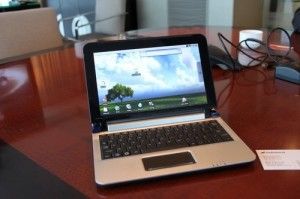 We’re getting a clearer picture of the operating system strategy from Google today as PCMag reports on Eric Schmidt’s closing keynote at IFA in Berlin. Apart from talking about the future of search, location search, fast search, personal search and the growth in mobile web and smartphones, he confirmed in a Q&A that Chrome OS is targeted at netbooks.
We’re getting a clearer picture of the operating system strategy from Google today as PCMag reports on Eric Schmidt’s closing keynote at IFA in Berlin. Apart from talking about the future of search, location search, fast search, personal search and the growth in mobile web and smartphones, he confirmed in a Q&A that Chrome OS is targeted at netbooks.
The next question is ‘what is a netbook’ but at least the strategy for Chrome OS aligns with what Google said on day one. If we consider Chrome OS to be a very fast way to access Google search and web applications and add the web application layer/web app store then you have a basic framework for a web-based user interface and application layer for a simple Linux-based PC. Interestingly, that Linux-based core could come from the Android space, from Linaro, from MeeGo or any of the other mobile-focused Linux platforms and could even contain an Android environment as part of the user-layer but we get the impression that Google is going it alone on this as a separate project. It will be interesting to see what netbook manufacturers pick it up and work their drivers and customisations into it because at the moment, the Intel/Nokia-backed MeeGo appears to have the better position.
With Chrome OS targeted at netbooks it would be easy to summise now that Android 3.0 is for next-gen high-end smartphones, tablets and smart-books. We need to be a little careful though because Google is also putting a lot of effort into TV and Eric Schmidt confirmed in his keynote that Android is a part of Google TV. Could this be the target for Android 3.0? Whatever the strategy here, the key point is that Google will open Android up to new screen sizes. Its a clear signal for developers to start thinking about large-screen applications.
When will this happen? Chrome partnerships will be announced later this year but Android 3.0 timescales are less clear.
With companies like Samsung, Dell and Toshiba moving real products into this space now and with Samsung pushing for 10M sales of the Galaxy Tab [That seems way too high to me Chippy] there must be people at Google thinking about speeding up the Android 3.0 process. Major changes to Market and their app suite would be needed so this isn’t a minor task but with HP, Nokia, Intel and others breathing down their necks, it has to happen soon.
See also: Question Marks that Remain Over Q4 Tablets
Sidenote: Intel are working on an X86 port of Android for their ‘always-on’ capable platforms for 2011. These platforms are targeted at the 4-10 inch screen space and so clearly something has to happen with large screen support. With Intel and a key member of the Open Handset Alliance and a close Google partner (Google TV for example) we should also watch for clues from that side of the camp. Intel are likely to have X86-Android ready for mid-late 2011 and this, according to Intel, will be offered up as an official X86 Android. Some of this Intel/Android work is also likely to be part of Google TV.
The full and very interesting keynote is available here.
Via netbooknews.de











Then why were people saying yesterday that Chrome is for tablets and Android is for phones? Google’s own tablet is due late November, running Chrome. Is anyone actually staying in the netbook game now that it’s basically been crushed by the iPad? As you pointed out, people see a netbook and think = Windows.
Reuters said that, not Google. Eric clearly stated that Chrome was for netbooks BUT manufactures could do wit it whatever they wanted.
Android 3.0 is clearly being designed for tablets, in fact several Google reps confirmed this a few months back when Google stole Palm’s top UI guy to remake Android. personally, i would expect Android to have major design overhaul in their multitasking & notifications which is what made webOS so critically acclaimed. but i also expect alot of other UI changes to make Android a more cohesive experience (and resolution scalable) & then MAYBE these silly manufactures will stop putting their own UI layers on top.
Chrome is a browser, tablets are not going back to the days of a stylus. Chrome would need a complete redesign to make it finger friendly. part of the reason these mobile OS’s are so successful is because they are “fun” to use, browsers are not fun.
Guys. New comment system being checked out. Any feedback? @jkretch set me up at Techcocktail San Francisco
testing the new comment system (Chippy)